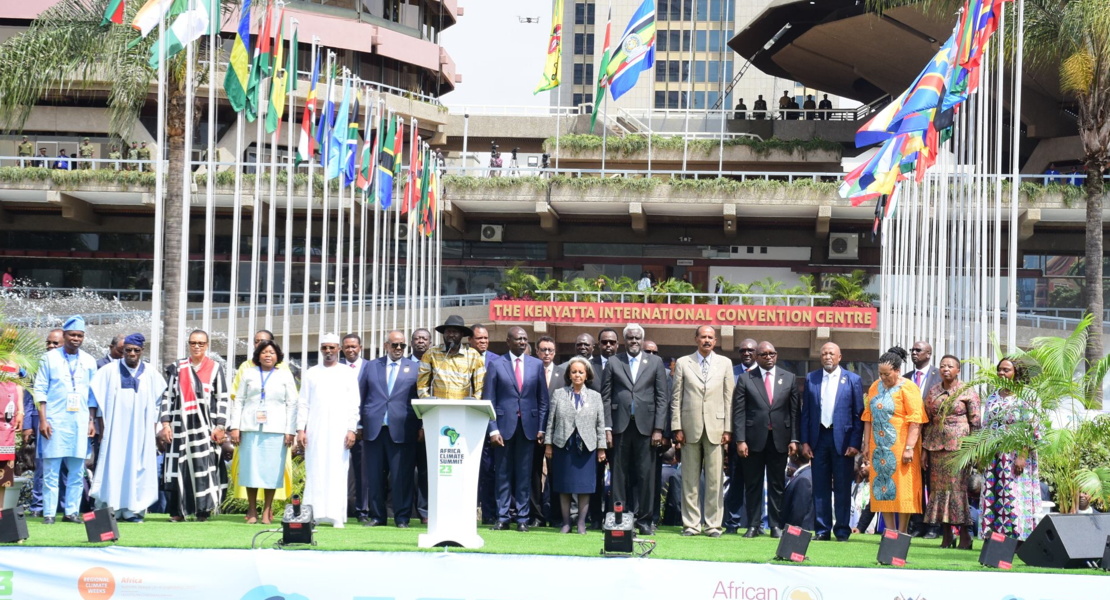The Africa Climate Summit has kicked off in Nairobi, Kenya, under the theme “Driving Green Growth and Climate Finance Solutions for Africa and the World.”
The three-day inaugural summit brings together African leaders, activists, representatives from the private sector, and civil society organizations. Their aim is to formulate financial solutions to address the climate change challenges affecting not only the continent but also the global community. The summit seeks to establish a unified voice as African leaders prepare to participate in the upcoming United Nations Conference of Parties (COP28) in Dubai.
Key on the agenda is the Nairobi Declaration that is scheduled to be adopted on Wednesday, September 6. The “Nairobi Declaration” is expected to articulate Africa’s position on climate change and outline the continent’s strategies for addressing this pressing issue head-on.
Despite contributing less than 4% of global carbon emissions, Africa is disproportionately affected by the consequences of climate change. Recent events such as widespread flooding and landslides have taken a toll on the continent, significantly impacting its GDP due to the need for adaptation.
According to a recent report by the World Meteorological Organization (WMO), over 110 million people in Africa were directly affected by weather, climate, and water-related hazards in 2022, resulting in economic damages exceeding US$ 8.5 billion. Tragically, there were 5,000 reported fatalities, with 48% attributed to drought and 43% to flooding.
Speaking during the opening of the Heads of State Session of the Africa Climate Summit on Monday, September 4, at the Kenyatta International Convention Centre (KICC), Kenya’s President William Ruto emphasized the importance of harnessing Africa’s potential for green economic transformation. He believes this path is not only feasible but also just and efficient, offering a route to achieving a net-zero world by 2050.
“Our untapped renewable energy potential, together with the world’s youngest population of skilled, motivated and industrial men and women, along with Africa’s abundant endowment of natural assets, from carbon sinks to arable land and mineral wealth, confer on us the indispensable fundamentals to swiftly become a cost-competitive industrial hub with ample capacity to decarbonize global manufacturing and green the economies of our continent and neighbourhoods.” Ruto said.
These, he argued, position Africa to become a cost-competitive industrial hub capable of decarbonizing global manufacturing and promoting environmentally friendly economies in the region.
Ruto further encouraged Africans to shift their perspective from grievances to opportunities in the context of climate action. “As soon as we do that, a nexus of feasible sequences begins to emerge in an unbroken continuum from potential to opportunity, and through investments and technological innovation, into green manufacturing and industrialisation, and shared prosperity.” He added.
Meanwhile, at the High-Level Opening of the Ministerial Session, H.E. Amb Josefa Sacko, the AU Commissioner for Agriculture, Rural Development, Blue Economy, and Sustainable Environment, emphasized that Africa’s green transition hinges on resource availability for investment. She advocated for substantial investments in climate resilience, particularly focusing on energy access to drive sustainable industrialization. Sacko believes this approach can swiftly reduce poverty and fundamentally reshape Africa’s economic model through investments in sustainable value chains.
“Africa’s potential in fostering its sustainable development and , its green transformation must be designed and led by African countries and African institutions and this should be centred on the mobilization of new and additional resources that can be deployed urgently.” she empahised.
Importantly, Sacko underscored that Africa’s sustainable development and green transformation must be spearheaded by African countries and institutions, with a central focus on mobilizing new and additional resources for urgent deployment.
The Africa Climate Summit is co-hosted by the government of Kenya and the African Union, running concurrently with Africa Climate Week (ACW 2023), one of four Regional Climate Weeks planned this year to build momentum leading up to the UN Climate Change Conference (COP 28) in Dubai. The summit has drawn the participation of over 30,000 delegates and at least 23 heads of state, including President Paul Kagame of Rwanda, President Azali Assoumani of Comoros, and President Nana Okufu Addo of Ghana. Distinguished guests, including UN Secretary-General Antonio Guterres, US climate envoy John Kerry, COP28 Director-General Majid Al Suwaidi, and COP28 President Sultan Al Jaber, are also in attendance.
Notably, President Museveni is not present at the summit; instead, he has delegated a group of ministers led by Minister of Water and Environment Hon. Sam Cheptoris to represent Uganda.

